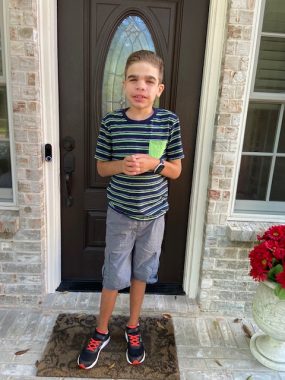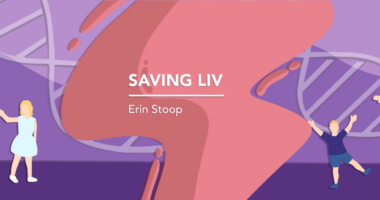Some Kids Might Go to College in Diapers

“Don’t worry, they won’t go to college in diapers!”
It’s the statement so many people give to parents as they go through the often difficult adventure of potty training.
In the United States, potty training is normally started between 21 and 36 months, though only 40-60% of children are successfully trained by 36 months, a 2008 article in American Family Physician noted. However, the expectation for children to master the potty by age 3 is prevalent in our society, particularly given the activities children may be barred from if they are not potty trained.
“Come join preschool, Sunday school, and the children’s museum camp! Unless you’re in still in diapers. Then, don’t come.”
This creates immense pressure for caregivers whose children may not yet be developmentally ready to potty train. Suddenly, diapers, which were so vital to the child’s early life, are now a hindrance, and getting your child out of diapers becomes a big deal. Parents generally want their child to join programs that will enrich their social, emotional, cognitive, and physical development, and they may worry about their child being left behind. Diapers go from being the most sought-after baby shower gift to an object of derision.
“Only babies wear diapers,” toddlers are often reminded. “You’re a big kid now. You don’t want to be a baby, do you?”
While most children do master toileting, some do not. We happen to be one of the latter families.
Prior to my son Will’s diagnosis with Sanfilippo syndrome, he struggled with potty training. He desperately wanted to accomplish it, but he seemed to have no awareness of his body. It was a difficult time for us. He wanted to go to preschool and other activities with his friends, and was brokenhearted that he couldn’t because he wasn’t potty trained.
I was a mess as I cried tears of frustration, wondering what was wrong with me that I couldn’t help my son reach this milestone, even after months of sustained attempts and using every method we could find. I was constantly reassured that he would “get it” and that “no one goes to college in diapers.”
No one, myself included, even considered the option that some children stay in diapers. But they do. And my son did.
Although Will’s diagnosis was devastating for us as a family, the knowledge of his condition did grant us a sense of relief from worrying about the milestones he was unable to reach. All children with Sanfilippo are different, and some can gain toileting skills, but Will was not one of them. And that’s OK. Now that we knew what we were experiencing, we could make better choices for him and focus our energy on developmentally appropriate skill sets.
Although we had made peace with our new lifetime commitment to diapering, the world had not. Well-meaning family and friends, not grasping how seriously our son’s condition impacted his development, would offer more tried-and-true tricks that “were sure to work.” Complete strangers would often weigh in if they noticed his shorts’ waistband slip, exposing a diaper line. The kind ones offered suggestions, thinking we needed help. The not-so-kind ones questioned our lack of parenting skills and shamed the permissive mindset of “parents these days letting kids do what they want.”
Children were very curious and confused, wondering why Will was violating their mental schemas. He was a big kid in diapers. He was not a baby. What was going on?
Several asked if he wore a diaper because he was a “bad” boy. The quick answer: “Nope, he’s not. His brain and body work a bit differently than yours, so he needs to wear them. Did you know that even some adults need to wear diapers because their brains and bodies may work differently, too?”
Once we knew that our son’s life was going to include diapers, we quickly discarded the notion of embarrassment. Our son had a medical condition. This was a medical necessity for his health and well-being. There was nothing to be embarrassed about.
Diapers have regained their status of importance in our house. They allow us to take Will out into the world and experience many things that wouldn’t be possible without the convenience they provide. Will gets to live a full life because of his diapers, and he is not the only one. Incontinence products give an entire population of people with various medical conditions a level of freedom they might not have otherwise.
So, I am here to tell you that, yes, potty training is hard. And while most kids will master it, some won’t, and that’s OK. My son may not be going to college in diapers, but we sent him off to sixth grade this week in them, and he’s doing just fine.

Will, 11, prepares for his first day of middle school. (Photo by Valerie Tharp Byers)
***
Note: Sanfilippo News is strictly a news and information website about the syndrome. It does not provide medical advice, diagnosis, or treatment. This content is not intended to be a substitute for professional medical advice, diagnosis, or treatment. Always seek the advice of your physician or other qualified health provider with any questions you may have regarding a medical condition. Never disregard professional medical advice or delay in seeking it because of something you have read on this website. The opinions expressed in this column are not those of Sanfilippo News or its parent company, Bionews, and are intended to spark discussion about issues pertaining to Sanfilippo syndrome.








William Holton
Back in 1970 to 71,i attended the University of Wisconsin at Madison.Back then,the Viet Nam war was going on and the hippie movement was very much alive.It was common for guys and girls to get together and study.I was invited to study with a couple of girls in their dorm rooms and i remember seeing cloth diapers and super large size baby plastic pants on some of them,as they wore them to classes because they didnt have enought time to use the restroom.During our study breaks,i would help the girls carry their laundry baskets from the laundry room to their dorm room and would see cloth diapers being dried in the clothes drier and several pairs of the plastic pants drying on the drying racks!It was mind blowing!